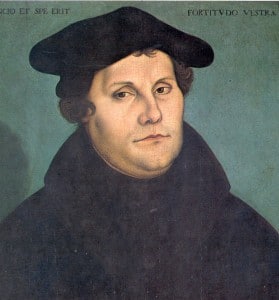 On 3rd January 1521, Pope Leo X issued the papal bull Decet Romanum Pontificem excommunicating Martin Luther, reformer, German priest and Professor of Theology, from the Catholic Church.
On 3rd January 1521, Pope Leo X issued the papal bull Decet Romanum Pontificem excommunicating Martin Luther, reformer, German priest and Professor of Theology, from the Catholic Church.
The Pope had asked Luther to retract his “Ninety-Five Theses” (full name: The Ninety-Five Theses on the Power and Efficacy of Indulgences or Disputatio pro declaratione virtutis indulgentiarum), which Luther had published in 1517, but Luther refused. Luther was then called by Charles V, Holy Roman Emperor, to renounce or defend his religious stance at the Diet of Worms. He did not back down, and Charles V issued the Edict of Worms on 25th May 1521, declaring Luther an outlaw and heretic.
In his Ninety-Five Theses, Luther had, amongst other things, attacked the sale of indulgences, emphasised that salvation was free through Christ by faith and repentance, explained the limiting power of the Pope, emphasised that true repentance should be a way of life and not earned by confession, and declared that it was blasphemous to consider the cross with papal arms on it as of equal worth of Christ’s cross.
Luther is known for his doctrine of “Justification by Faith”, the idea that salvation and redemption were only attainable through faith in Christ and by God’s grace. Luther said “This one and firm rock, which we call the doctrine of justification, is the chief article of the whole Christian doctrine, which comprehends the understanding of all godliness.”
You can read more about Martin Luther’s Ninety-Five Theses in my article “Martin Luther and Anne Boleyn”, which also examines whether Anne was a Lutheran or Protestant.